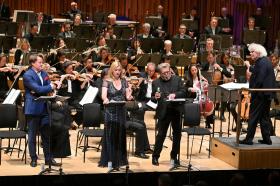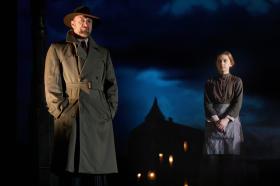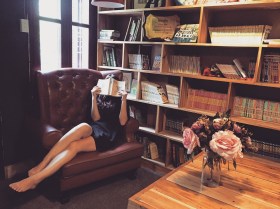How many times have you defended the arts to your family, your friends, or to casual conversationalists on public transportation? I’ve done it. We’ve all done it. The problem was that I was getting tired of doing it. I was worn out. If you work in the theatre in some capacity you have uttered those words: “The arts are important.” But, why? The platitudes that one normally uses to defend the practice of an artistic life were sounding dangerously hollow to me. I said them so many times in nearly every facet of my life. They didn’t mean anything to me anymore. I was worried I’d made a mistake. Maybe I should heed my father’s advice and reconsider law school? Maybe I should start thinking about getting a job that offered a retirement package and health insurance that included a dental plan?
I was going into my twenty-ninth year. I don’t want to say that I was having an existential crisis, but I guess that I sort of was. I’d spent the better part of my twenties pursuing the career of a professional theatre director. Assisting at big regional theatres while pursuing my own projects at small and midsize organizations. It never made me rich, but this life had always given me a deep spiritual satisfaction. At least till now. Had my life up to this point been a waste of time? Did the way I naturally participate in the world matter to anyone?
I had been on a “lucky streak” the previous year. I’d scraped together enough directing jobs to cover all my expenses. No “day job” for this guy. I wasn’t going to be on MTV Cribs any time soon, but I was a working artist and that was something to be proud of. However, I was burned out. I’d been primarily making work for people of means—the one percent. I looked around on opening nights and saw a sea of well-coiffed people enjoying a night out. Who was I creating work for? I’d been so busy trying to hustle and live on my theatre work that I had forgotten the prime tenet that drives my life: everyone deserves great art. I was just trying to live, by doing what I do best, but I felt like I’d betrayed my principals in some way. I was directing professionally and getting paid to do it. I was livin’ the dream! And yet I felt so sad and unsure of myself. At exactly the time when I should have been at my most joyful I was at my lowest.
This search for clarity led me to different avenues of performance, until I finally came upon an organization called Open Hearts and Open Minds. Executive Director Johnny Stallings has been working with adults in custody (AIC) for the better part of a decade. He asked if I would be interested in volunteering to co-direct Shakespeare’s Hamlet at Two Rivers Correctional Institution in Umatilla, Oregon. I was very frightened.

OK, lets be honest. I was basically shitting my pants. In society we are taught not to allow “cons” into our lives. They never learn. They never change. These were the stereotypes that were running through my head. And Johnny wanted me to be in a room with them? Alone? If someone tried to stab me with a shank who would save me? What if a note of mine pissed off one of the guys? What if the person that I cast as Osric was unhappy with his part and fashioned a toothbrush to stab me in my carotid artery? These were legitimate fears at the time.

As you might have guessed, other then having seen The Shawshank Redemption, I had no experience in prisons of any kind. But I decided to take a leap and the next week, I found myself in a maximum-security prison, in a tiny room with twenty-one other men. They were huge, intimidating, and hilarious. We laughed a lot that first day as we got to know one another. Most importantly, they were as interested in theatre as I was. Maybe even more. We found common ground quickly and the conversation flowed far easier then I originally expected. These guys came to the room with easy smiles and nimble minds. They were all searchingly introspective and, without an exception, there wasn’t one person in the group who didn’t think they belonged in prison. Everyone realized the mistakes they had made and wanted more than anything to atone for those past transgressions. They just needed an avenue and a form to express this.

For these men, the act of performance became that avenue that they so desperately needed. This was a surprising realization for me. It wouldn’t be the last time that I was pleasantly surprised by these actors and made to rethink my own societal biases and preconceived notions. Artists come in every shape and size from every walk of life. Theatre truly is the most egalitarian of professions. Nobody cares where you come from. Do you have an interesting point of view? Can you tell a story well? If you do and you can, you will be welcomed into the profession no matter what wreckage lies on the shores of your past. These were things to remember and repeat.
Over the weeks and months that followed, that room became a sanctuary of joy for me from the outside world. The irony of going into prison to find peace was not lost on me. I looked forward to going behind those gates. My weeks were filled with anticipation of the three-hour drive to see the cast of Hamlet in Umatilla. I found out that the rehearsal room we cultivated meant just as much to the actors as it did to me. It was their escape from the everyday mind-numbing routine of prison. In that room, once a week, we were able to have deep, meaningful dialogue with one another that is often hard to find in the “free world,” let alone in a rehearsal room. I saw the men grow in confidence, pick one another up after a setback, and believe in each other when things were uncertain. Above all, I saw these men trust. They trusted in me and in the work we were doing every Saturday. Trust is the greatest gift any human being can give another. It causes you to be open and vulnerable to others. These men whom I was lucky enough to work with, who have endured some of the most painful life experiences I’ve ever heard, who had every reason not to trust anyone ever again, gave it to me and to one another freely. It was an incredible gift and an amazing reminder to always start any collaboration from a place of trust and love.

I realized that when I’d been directing a play for a paying audience, I’d been obsessed with returning that monetary investment that a producer had made in me. I had to get good reviews and fill the seats, or else I’d never be hired again. My choices were often dictated by a fear of failure and I see now that my work reflected that. I let my own ego get in the way of conquering a text through collaboration. I often closed actors off creatively. It was a sad thing to realize, but who wouldn’t get burnt out with an attitude like that? I started to question my motivations because my motivations were questionable. The end product isn’t the thing. The thing is the work that you do with the people in that room. The work is always the best part. Or it should be. I’d forgotten that. It wouldn’t happen again.

I came to see that the expectation was different with Hamlet. I had no monetary investment to protect. I came to see my role in that rehearsal room as offering an opportunity for someone to be beautiful, for however brief a time, in an environment that is completely bereft of beauty. Working in this way with these men for six months changed how I work as a director and changed me as a human being. Now when people ask me why the arts are important, I tell them with conviction how theatre can change lives. I say this because I saw these men, with my own two eyes, use the words of Shakespeare to transcend the walls of Two Rivers Correctional Institution. There were moments when we were all no longer confined in that place. We were on another plane of existence that most people can only hope to glimpse, and we went there nearly every week. The rush was incredible. The joy was palatable.
I saw a man of limited literacy memorize and deliver poetry like he had been born to do it. I felt the joy of brotherhood and shared experience when an actor perfectly executed a piece of brilliant stage business, and the whole rehearsal room erupted in thunderous shouts, applause, and hugs. I know how important theatre can be and how everyone deserves it in their lives. Especially those among us who have the least access to it. I know. I believe. And so should you.
First published on HowlRound





